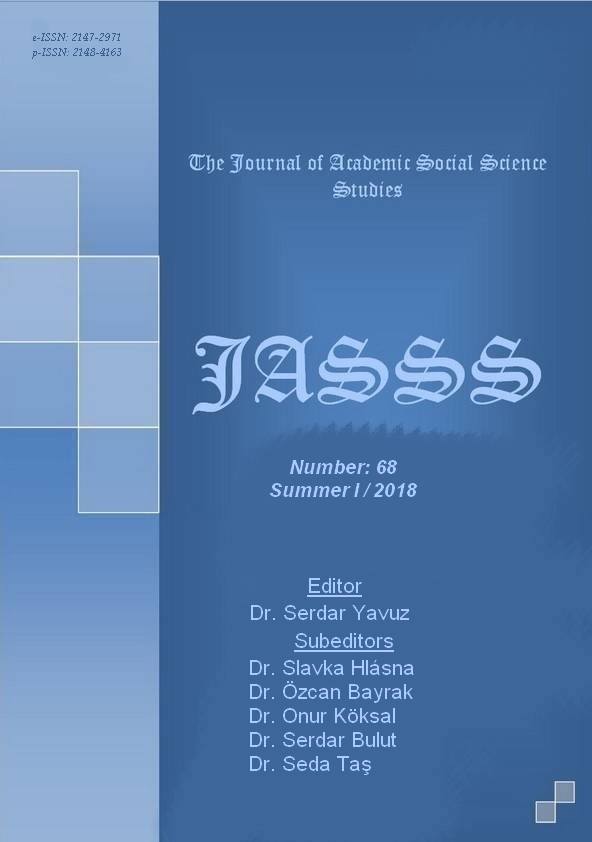MEDYA VE TELEVİZYON OKURYAZARLIĞI: BEDEN EĞİTİMİ VE SPOR ANABİLİM DALI LİSANSÜSTÜ PROGRAMLARA BAŞVURAN BİREYLER ÜZERİNE BİR ÇALIŞMA
Author :
Abstract
Bir toplumun gelişim düzeyi, insanların okur yazar olması ile doğrudan ilişkilidir. Okur yazarlık arttıkça, eğitim seviyesi artacak ve toplumlar gelişimini sürdürmeye devam edecektir. Genel olarak medya ve özelde televizyon, modern toplumun ve toplumsal yaşamın önemli unsurlarından birini teşkil etmektedir. Mesajların yazılı, görsel veya işitsel olarak topluma iletilme aracı olarak kullanılan medya ve televizyonun bireysel, sosyal, ekonomik ve siyasal yaşamda önemli bir yere sahip olduğu hemen her kesim tarafından kabul edilmektedir. Bu düşünceden hareketle araştırmanın amacı, Beden Eğitimi ve Spor Anabilim Dalı lisansüstü programlara başvuran bireylerin medya ve televizyon okuryazarlık düzeylerini incelemektir. 2016-2017 Eğitim-Öğretim yılı bahar yarıyılında Marmara Üniversitesi, Beden Eğitimi ve Spor Anabilim Dalı lisansüstü programına başvuran toplam 121 birey (38 kadın, 83 erkek), araştırmanın çalışma grubunu oluşturmuştur. Araştırmada veri toplama aracı olarak; Korkmaz ve Yeşil (2011) tarafından geliştirilen ‘Medya ve Televizyon Okuryazarlık Düzeyleri Ölçeği’ kullanılmıştır. Veriler; betimsel istatistiki yöntemler, bağımsız gruplar için t-testi, tek yönlü varyans analizi (ANOVA) ve Tukey testi kullanılarak analiz edilmiştir. Araştırma sonucunda, kadın ve erkek bireyler arasında medya ve televizyon okuryazarlığı açısından manidar bir farklılık tespit edilememiştir. Diğer taraftan dergi, gazete gibi süreli yayınları takip edenler ile etmeyen bireyler arasında anlamlı farklılıklar tespit edilmiştir. Ayrıca, lisans mezuniyeti sonrası ailesinden maddi ve manevi destek alanların ortalama puanlarının daha yüksek olduğu belirlenmiştir.
Keywords
Abstract
The level of development of a society is directly related to the fact that people are literate. As literacy increases, the level of education will increase and societies will continue to develop. In general, media and in particular television constitute one of the important elements of modern society and social life. It is accepted by almost all people that media and television, which are used as means of collective communication of written, visual and audio messages, have an important place in individual, social, economic and political life. The purpose of researching this thought is to examine the media and television literacy levels of the individuals applying for the post-graduate programs in Physical Education and Sports Department. In the spring semester of 2016- 2017 academic year, a total of 121 individuals (38 women, 83 men) applying to the post-graduate program in Marmara University Physical Education and Sports Department have formed the study group. As a data collection tool in the study; “Media and Television Literacy Levels Scale” developed by Korkmaz ve Yeşil (2011) was used. The data has been analysed through descriptive statistics, t-test for independent groups, one-way analysis of variance (ANOVA) and Tukey test. As a result of the research, no significant difference has been ascertained between women and men in terms of media and television literacy. On the other hand, some significant differences have been identified between the individuals who followed the periodicals such as magazines and newspapers, and those who did not. Furthermore to this, it has shown that the average grades of the students who have gotten financial and sentimental support from their families following their post- graduate were higher.





